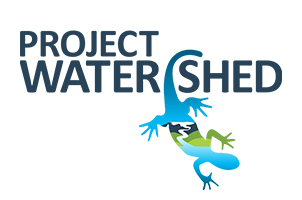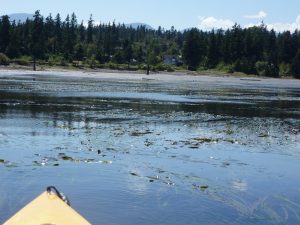September 23-29 has been designated as National Estuary Week by the organization Restore Americas Estuaries so Project Watershed encourages you to get out and do something good for the estuary like picking up garbage or removing some invasive plants. There are a variety of groups and locations registered for the Great Canadian Shoreline Clean-up including Project Watershed and Comox Valley Nature who will be doing their work on 29 Sep.

Volunteers preparing to transplant eelgrass. Photo by Crystal Norman of Unique Roots Photography (http://uniqueroots.ca)
Project Watershed would like to thank our volunteers and our sponsors for making this a very successful summer for Blue Carbon. As mentioned, Project Watershed carried out a compensation transplant which resulted in around 34,000 stems being planted around the Trent River Estuary which should result in a great deal of additional habitat for all the organisms that live there.
As well, thanks to a generous donation from the Pacific Salmon Foundation we were able to transplant around 4,000 stems near the Royston area. This new vegetation will increase the carbon sink available in the K’omoks Estuary. We had planned to continue populating the area beside the Royston Wrecks which had been denuded due to years of being overshadowed by log booms but this proved impossible as the previous two transplants of less than 1,000 stems has grown and spread to the point that there is little room left for additional plants.
“I couldn’t believe how much eelgrass was in the bay when I went over there kayaking,” said Kathryn Clouston, an employee of Project Watershed. “It was great, too, to see a family of about a dozen mergansers taking advantage of the food that was sheltering in the eelgrass.”
Project Watershed has also made some good progress on our Blue Carbon project thanks to some funding from the Climate Action Secretariat and our awesome volunteers. Biologist Angela Spooner has taken some biomass measurements which provide some initial data on the amount of carbon that can be sequestered by eelgrass in various locations, both intertidal and subtidal. We have also made some progress on verifying our eelgrass map thanks to all of the sponsors mentioned above. We hope to continue progressing our Blue Carbon project with our stewardship partners in the years to come.


